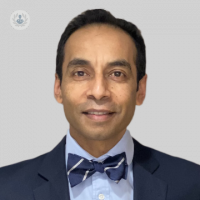Skin cancer: Risk factors, prevention and the key symptoms to be aware of
Written by:Whether travelling abroad for some summer sun or soaking up the rays in your local park, it’s vital to be aware of the risks of skin cancer and how to protect your skin from UV damage. In this informative guide for patients, highly respected consultant dermatologist Dr Ravi Ratnavel shares his expert insight on the most common symptoms and signs of skin cancer and its associated risk factors. The revered specialist also discusses the various forms of the disease and details how skin cancer is diagnosed and treated.

Are there different types of skin cancer?
Skin cancer is a form of cancer which originates in the skin cells and often results from ultraviolet (UV) radiation damage from the sun or tanning beds. The three primary kinds of skin cancer are melanoma, squamous cell carcinoma, and basal cell carcinoma.
What are the symptoms of skin cancer?
Depending on the type and stage of the cancer, there might be a wide range of symptoms of skin cancer. The formation of new moles, changes in the size, shape, or colour of a mole or other skin lesion, or the emergence of a sore that does not heal are examples of common symptoms. Other signs may include bleeding, lesion crusting, or itching.
What are the risk factors for skin cancer?
Exposure to UV radiation from the sun or tanning beds is the main risk factor for developing skin cancer. Having a fair complexion, a family history of skin cancer, a history of sunburns or other UV exposure, or a compromised immune system can also increase a person’s risk of developing skin cancer.
How is skin cancer diagnosed?
Typically, a biopsy is used to identify skin cancer. During this procedure, a sample of the suspicious lesion is removed and inspected under a microscope. To determine the extent of the cancer, additional diagnostic procedures like a CT scan or MRI may also be carried out.
What are the treatment options for skin cancer?
The type and stage of the skin cancer, as well as the patient's general condition, determine which types of treatments are suitable for the individual patient. For most kinds of skin cancer, surgery is the most common form of treatment. Chemotherapy, immunotherapy, and radiation therapy may also be used in some cases.
Can skin cancer be prevented?
The risk of skin cancer can be reduced by wearing protective clothes, using sunscreen and limiting exposure to UV radiation from the sun and tanning beds. It’s also important to regularly perform self-exams of the skin so you are aware of any changes. Visiting a dermatologist for a thorough skin examination in order to spot any potential skin cancer symptoms as soon as possible is also key.
If you are concerned about skin cancer and wish to schedule a consultation with Dr Ratnavel, you can do so by visiting his Top Doctors profile.


